Favourites lists are tricky things, whether they’re for books, films, games, songs or something else. People often rank a particular work highly merely for its personal nostalgia value. Fair enough, but don’t expect the same sentiments to reverberate in the reader. Other works might seem to deserve a place in the rankings because it was innovative in its day even if the techniques it pioneered has since been replicated and even improved upon elsewhere. Jurassic Park with its use of CGI is one such example for me: I shall never forget that magical first sight of the magnificent brachiosaurus towering above the awestruck humans while docilely munching from a tree.
Another reason to rank a film highly is because you enjoy watching it over and over again. Yet however much I enjoy action films like Raiders of the Lost Ark or The Matrix, I have reservations about including them in my list of favourite films. It feels to me that a film needs to be something a little more profound and substantial to merit special mention.
With all this in mind, here’s a selection of five of my favourite films, arranged in no particular order. They’re favourite films to me in the sense that I like them a lot, that I like others to watch them and hear what they think of them and that I greatly admire the people who crafted them and wish that I had a modicum of their talent. Do note however that I watch fewer films that I probably ought to so my list is only drawn from a fairly small sample. Spoilers follow by necessity.
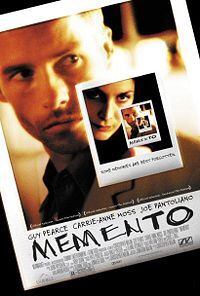 Memento
Memento
I don’t have much to add that hasn’t already been said about Memento. The reverse chronological order of one of its two narratives strikes some as gimmicky, but I think that it is essential to placing the viewer in the shoes of the confused Leonard Shelby. The way the two narratives, one in colour, the other in black-and-white, merges into one as the film inexorably approaches its dread-filled climax is stylistically brilliant and makes the progression of the film feel like an unraveling puzzle.
Philosophically, it’s true that the film isn’t that deep, but the way it raises the questions of how central memories are to human personality and how easily we lie to ourselves in order to protect our own self-image is chilling. The people around Shelby viciously abuses his condition for their own ends, and director Christopher Nolan seems at first to draw audiences to be sympathetic to his unique plight through scenes such as Shelby’s Sisyphean efforts to expunge his pain of losing his wife by destroying mementos of their life together. But ultimately it is Shelby’s own willingness to manipulate himself just as callously and cynically as his abusers that is the greatest tragedy.
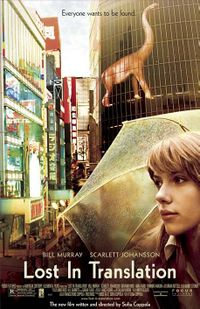 Lost In Translation
Lost In Translation
Quiet and subtle, this film of two people feeling as lost and directionless in their lives as they physically and culturally are in Japan is bereft of any clear denouement and is all the more refreshing and satisfying for that. Sofia Coppola paints a Nippon of strange wonders: gleaming neon-lined skyscrapers and sombre temples, kinky strip clubs and incomprehensible talk shows. Bill Murray and Scarlett Johansson play characters who wander through the alienating cityscape, each plagued with self doubts over their future and finding refuge in a bar filled with fellow transients.
There’s no grandstanding in this film, no great revelations or final lessons to bring home. Instead, we have a series of affecting and even existentialist moments that feel natural and spontaneous: a taxi ride back to the hotel after a tired night of partying, glass windows as insulation against the clamor of Tokyo; a shared chuckle over the shallowness of a press conference with a bubbly movie star; learning bonsai from elderly Japanese ladies; a reconciliation after a tiff in slippers and shorts during a false fire alarm; and of course, almost, but not-quite, love.
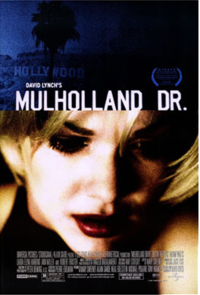 Mulholland Drive
Mulholland Drive
The first mistake to avoid when watching Mulholland Drive is trying too hard to make sense of it all. The disparate threads are individually straightforward enough: a young wannabe actress (played by Naomi Watts with frightening intensity) arriving in Hollywood to realize her dreams only to meet an amnesic woman with a mysterious past and $50,000 in her handbag; a hotshot director harried and threatened by ominously powerful mobsters to cast a particular young woman for a film project; a man recounting a recurring dream of a horrific being in a diner and a bungling hit man in search of a “black book” of incriminating secrets.
Yet as the different threads begin to tie together the film suddenly switches to an altogether different reality, one that seems harsher and crueler. Part of what makes this film so irresistible is that you come tantalizingly close to connecting all the plot points together but as David Lynch no doubt intended, you never quite get there. Surreal, arcane and subject to endless interpretations, this is one film you will be thinking about a long time after you’ve seen it. What does the appearance of the maliciously grinning elderly couple even mean?
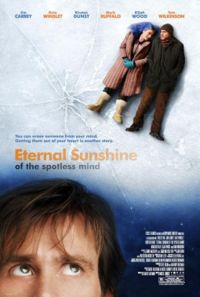 Eternal Sunshine of the Spotless Mind
Eternal Sunshine of the Spotless Mind
By and large, I tend to be dismissive of romantic films, regarding them as somewhat like action movies for women. Eternal Sunshine of the Spotless Mind however is an exception: both original and sweet, it depicts the full cycle of a romance, from flirting and dating to fully-blossomed passionate love to being tired of each other and wondering why they even bother to be together. And then of course, this being a screenplay by Charlie Kaufman, it starts over again anew thanks to a science fictional plot device.
Love is clearly not an eternally unchanging fairy tale in this film. In the real world, there are no matches made in heaven. Personality traits that seem endearing may become annoying when the first bloom of passion fades. Couples stay together only through conscious effort and continuous compromise. These are the lessons that the oddly, yet in the end perfectly, matched pair played by Jim Carrey and Kate Winslet learns when they try to ease their pain of breaking up by erasing their memories of each another. Special kudos are due to director Michael Gondry for the most creative use of CGI yet seen in film.
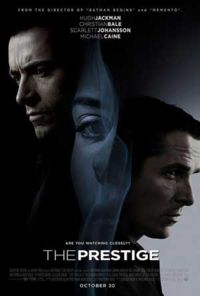 The Prestige
The Prestige
Christopher Nolan strikes again with what I consider to be an almost perfectly crafted film. This tale of obsessive rivalry is meticulously plotted: each and every scene serves a purpose and often more than one as specific scenes and lines of dialogue take on new shades of meaning as more of the plot is revealed. Perhaps the most surprising thing about The Prestige is how deeply it engrosses the viewer in the machinations of the two rival magicians despite the fact neither truly deserves sympathy: we divine early on that the duel can only end badly for both of them as well as the people around them. As we watch them make ever greater sacrifices in their game of one-upmanship, it’s as if we’re being drawn ever deeper into a dark and terrible abyss from which there can be no going back.
This intelligent film scores bonus points for the unconventional casting of David Bowie as Nikola Tesla and for Nolan’s now signature non-linear narrative, especially the ingenious use of journals within journals. Robert Angiers’ ultimate version of the Transported Man trick also carries intriguing philosophical implications about individual identity and responsibility, though they’re not fully explored in the film.
Again, favourites lists are tricky things, but they’re interesting things as well. Lists of favourite films are particularly useful as convenient barometers of individual taste and cultural depth though keep in mind that the choices also reflect what an individual wishes others to think of themselves. Here’s IMDB’s list of the Top 250 films to start you off on your own list of favorite films.
Admit it dude.. Scarlett Johansson is two of your favourite movie…drooling…boobs!! drooling…salivate…. Could you recall the way the dress as a magician assistant.. wish the tesla coil is real…we can have many many Johansson.. Threesome..tensome…u name it..alas..